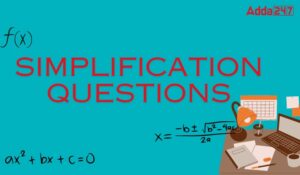Dear Students,
Quantitative Aptitude Questions for IBPS Exam
Quantitative Aptitude is a very important section you must prepare if you are aiming for a job in Bank or Insurance sector. These two weeks are very important as IBPS RRB PO and IBPS RRB Clerk Mains are lined up. So, these 15 questions can help you practice three very important topics of Quant Section.
Q1. There are five boxes in a cargo hold. The weight of the first box is 200 kg and the weight of the second box is 20% higher than the weight of the third box, whose weight is 25% higher than the first box’s weight. The fourth box at 350 kg is 30% lighter than the fifth box. Find the difference in the average weight of the four heaviest boxes and the four lightest boxes.
(a) 51.5 kg
(b) 75 kg
(c) 37.5 kg
(d) 112.5 kg
(e) None of these
Q2. There were 42 students in a hostel. Due to the admission of 13 new students, the expenses of the mess increase by Rs. 30 per day while the average expenditure per head diminished by Rs. 3. What was the original expenditure of the mess?
(a) Rs. 630
(b) Rs. 580
(c) Rs. 620
(d) Rs. 640
(e) None of these
Q3. 4 years ago, the respective ratio between 1/2 of A’s age at that time and four times of B’s age at that time was 5 : 12. Eight years hence 1/2 of A’s age at that time will be less than B’s age at that time by 2 years. What is B’s present age?
(a) 10 years
(b) 14 years
(c) 12 years
(d) 5 years
(e) 8 years
Q4. The simple interest accrued on a sum of certain principal is Rs. 2000 in five years at the rate of 4 p.c.p.a. What would be the compound interest accrued on same principal at the same rate in two years ?
(a) Rs. 716
(b) Rs. 724
(c) Rs. 804
(d) Rs. 816
(e) None of these
Q5. A jar contains a mixture of two liquids A and B in the ratio 4 : 1. When 10 litres of the mixture is taken out and 10 litres of liquid B is poured into the jar, the ratio becomes 2 : 3. How many litres of liquid A was contained in the jar?
(a) 14 litres
(b) 18 litres
(c) 20 litres
(d) 16 litres
(e) None of these
Directions (6-10): What will come in place of question mark (?) in the following number series?
Q6. 121, 144, 190, 259, ?, 466
(a) 351
(b) 349
(c) 374
(d) 328
(e) None of these
Q7. 8, 64, 216, 512, 1000, 1728, ?
(a) 4096
(b) 2744
(c) 3375
(d) 2197
(e) 4913
Q8. 3, 4, 10, 33, 136, 685, ?
(a) 3430
(b) 4802
(c) 5145
(d) 4116
(e) 5488
Q9. 16, 12, 18, 40.5, 121.5, 455.625, ?
(a) 2050.1125
(b) 2050.2125
(c) 2050.3125
(d) 2050.4125
(e) 2050.5125
Q10. 4, 18, 48, 100, 180, 294, ?
(a) 448
(b) 424
(c) 436
(d) 460
(e) 412
Directions (11-15): The following bar graph shows the total no. of students (in thousands) of three different colleges over five different years.
Study the carefully to answer the following questions.
Q11. What is the average no. of students in college B over all the years?
(a) 18000
(b) 20000
(c) 23000
(d) 14000
(e) None of these
Q12. Total no. of students over all the years is least in which college?
(a) A
(b) B
(c) C
(d) B and C both
(e) A and B both
Q13. The no. of students of college B in year 2008 are what percent more or less than the no. of students of college A in same year?
(a) 25% less
(b) 25% more
(c) 30% more
(d) 35% less
(e) None of these
Q14. What is the difference between total no. of students of college B and that of college C overall the years
(a) 30 thousands
(b) 25 thousands
(c) 35 thousands
(d) 22 thousands
(e) None of these
Q15. Find the ratio of total students of college A to that of the college B over all the years:
(a) 3 : 2
(b) 3 : 1
(c) 2 : 3
(d) 1 : 1
(e) None of these
You may also like to Read:
- Quantitative Questions for upcoming Banking and Insurance Examinations
- Study Notes of Quantitative Aptitude
- Practice More Data Interpretation Questions
- Quantitative Aptitude Section Strategy





 Simplification Questions For Bank Exams ...
Simplification Questions For Bank Exams ...
 Quantity Comparison Questions for Bank E...
Quantity Comparison Questions for Bank E...
 Mixture & Alligation Questions for B...
Mixture & Alligation Questions for B...




